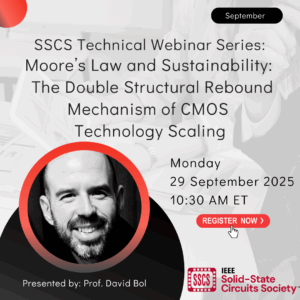
- This event has passed.
 Abstract: Semiconductor production represents a significant share of the greenhouse (GHG) emissions and other life-cycle environmental impacts of electronic equipment. To reduce the impacts of the semiconductor industry, the mainstream sustainability agenda relies on the purchase of renewable energy and on the pursuit of efficiency. Efficiency improvements are achieved at two levels: the energy/resource consumed per wafer and the silicon area consumed per function (i.e. one CPU core, one GB of memory). This latter silicon efficiency results from CMOS technology scaling to implement Moore’s Law. Unfortunately, despite these efficiency improvements, we observe a fast increase in the GHG emissions of the semiconductor industry, which constitutes a typical example of “backfiring” rebound effect.
Abstract: Semiconductor production represents a significant share of the greenhouse (GHG) emissions and other life-cycle environmental impacts of electronic equipment. To reduce the impacts of the semiconductor industry, the mainstream sustainability agenda relies on the purchase of renewable energy and on the pursuit of efficiency. Efficiency improvements are achieved at two levels: the energy/resource consumed per wafer and the silicon area consumed per function (i.e. one CPU core, one GB of memory). This latter silicon efficiency results from CMOS technology scaling to implement Moore’s Law. Unfortunately, despite these efficiency improvements, we observe a fast increase in the GHG emissions of the semiconductor industry, which constitutes a typical example of “backfiring” rebound effect.
In this webinar, we propose a demonstration showing that pursuing CMOS technology scaling for silicon efficiency improvement at the micro-level of a wafer mechanically results in an increase of the absolute global environmental impacts of semiconductor production at the macro-level of the industry. We will analyze this double rebound mechanism that is structural to Moore’s Law and to the current business model in the semiconductor industry. This calls for rethinking the business model of the semiconductor industry, should we be serious about mitigating its contribution to climate change.
Bio: David Bol is a Professor at UCLouvain. He received the Ph.D degree in Engineering Science from UCLouvain in 2008 in the field of ultra-low power digital nanoelectronics. In 2005, he was a visiting Ph.D student at the CNM, Sevilla, Spain, and in 2009, a postdoctoral researcher at intoPIX, Louvain-la-Neuve, Belgium. In 2010, he was a visiting postdoctoral researcher at the UC Berkeley Lab for Manufacturing and Sustainability, Berkeley, CA. In 2015, he participated to the creation of e-peas semiconductors spin-off company, Louvain-la-Neuve, Belgium. Prof. Bol leads the Electronic Circuits and Systems (ECS) group focused on ultra-low-power design of integrated circuits for environmental and biomedical IoT applications with a holistic focus on environmental sustainability. He is actively engaged in a social-ecological transition in the field of ICT research with a post-growth approach. Prof. Bol has authored more than 150 papers and conference contributions and holds three delivered patents. He (co-)received four Best Paper/Poster/Design Awards in IEEE conferences and supervised the PhD thesis of Charlotte Frenkel who received the 2021 Nokia Bell Scientific Award and the 2021 IBM Innovation Award for her PhD. On the private side, Prof. Bol pioneered the parental leave amongst male professors at UCLouvain, to spend time connecting to nature with his family in a post-growth deceleration.
Register: https://ieee.webex.com/weblink/register/r6ced06bf5685c6d972e0698e963a8664



